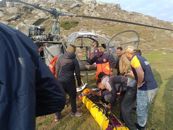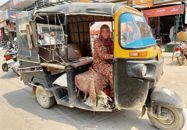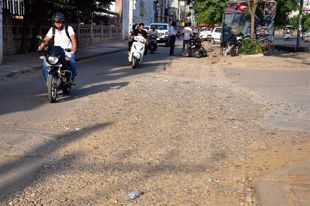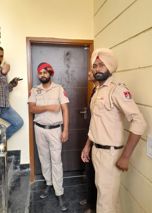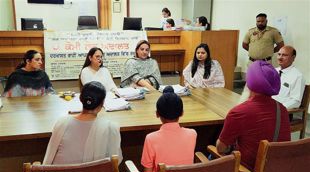Personal belongings including a child's pram are seen on the road next to a car days after a mass infiltration by Hamas gunmen from the Gaza Strip, near Kibbutz Kfar Aza, in southern Israel, on Tuesday. Reuters
Kfar Aza, October 11
On the road approaching this rural village, the bodies of militants lie scattered between the shells of burned-out cars. Walls and doors of what used to be neatly kept stucco homes are blasted wide open. As bags holding the bodies of slain residents await identification, the smell of death hangs thick in the hot afternoon air.
This is the scene confronting Israel's military as it battles to beat back a sweeping assault launched by Hamas from the Gaza Strip.
“You see the babies, the mothers, the fathers in their bedrooms and how the terrorists killed,” Maj Gen Itay Veruz, a 39-year veteran of the Israeli army who led forces that reclaimed the village from militants, said on Tuesday as he stood amid the wreckage.
“It's not a battlefield. It's a massacre.”
The Israeli military led a group of journalists, including an Associated Press reporter, on a tour of the village on Tuesday, a day after retaking it from what they said was a group of about 70 Hamas fighters.
Kfar Aza, surrounded by farms and just a few minutes down a country road from the heavily fortified fence Israel erected around Gaza, is one of more than 20 towns and villages attacked by Palestinian fighters early on Saturday. Before the attack, the kibbutz, whose name means “Gaza village” in English, was a modestly prosperous place with a school, a synagogue and a population of more than 700.
Walking through what is left provides chilling evidence of its destruction.
On the town's perimeter, the gate that once protected residents had been blasted open. Inside the settlement, the doors of many homes had been blown from their hinges by militants using rocket-propelled grenades. Throughout the town, walls and torched cars are riddled with bullet holes, tracing a path of violence that continues inside to bedrooms with mattresses spattered in blood, safe rooms that could not withstand the attack, even bathrooms.
Inside one partially destroyed home a framed quotation from a popular television theme song hinted at what Kfar Aza meant to its residents: “I'll be there for you, because you're there for me, too,” it read. “In this house, we are friends.”
Outside, unexploded hand grenades were scattered on the ground. A few minutes away, a Hamas flag lay crumpled in the dirt near a paraglider, used by militants to attack by air.
By the time journalists were escorted into the town on Tuesday, rescuers had already removed the bodies of most of the villagers killed in the attack. But reporters watched as crews carried several more bags containing bodies to a truck and then to a lot in front of Kfar Aza's synagogue, where workers attached name tags.
An AP reporter saw the bodies of about 20 militants, many of them badly bloated and disfigured. Hundreds of Israeli soldiers, in helmets and body armour, patrolled the town on Tuesday, as the sounds of explosions and gunfire echoed in the distance.
Veruz, retired from the military for eight years before he was recalled on Saturday, said the scene was unlike anything he had ever witnessed, even in a country where violent clashes with Hamas and other militant groups are frequent. A military spokesman, Maj Doron Spielman, agreed, comparing the toll in Kfar Aza and nearby villages he visited to scenes he witnessed as a New Yorker after the September 11, 2001 terrorist attacks.
“I remember going through 9/11 and waking up the next day, the next week, and everything had changed,” he said. “It's the same thing again. But worse because we're such a small country.”
Join Whatsapp Channel of The Tribune for latest updates.






